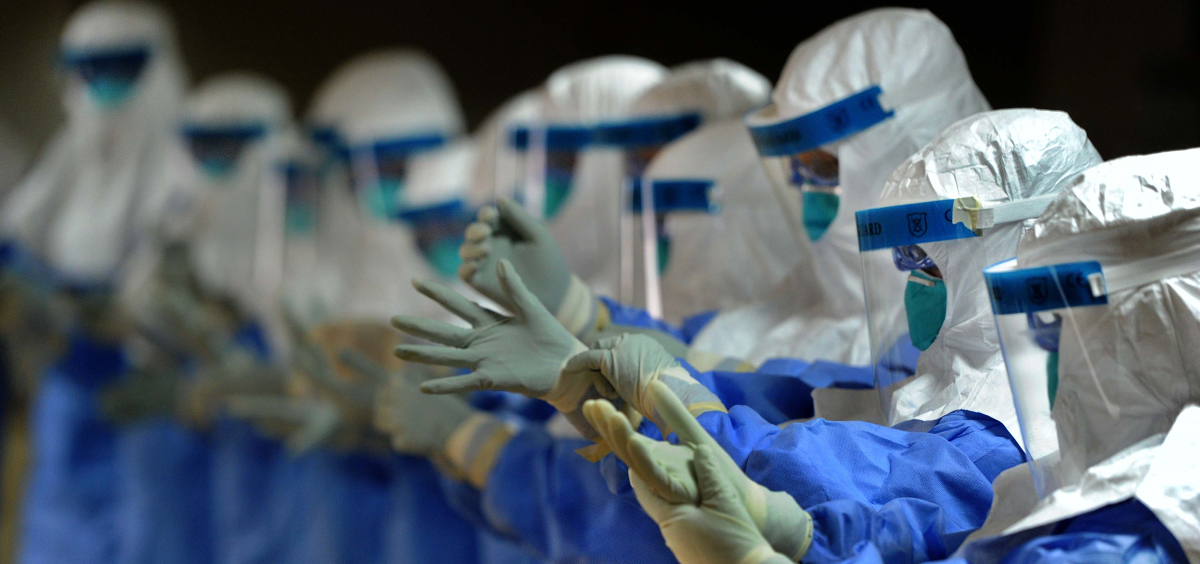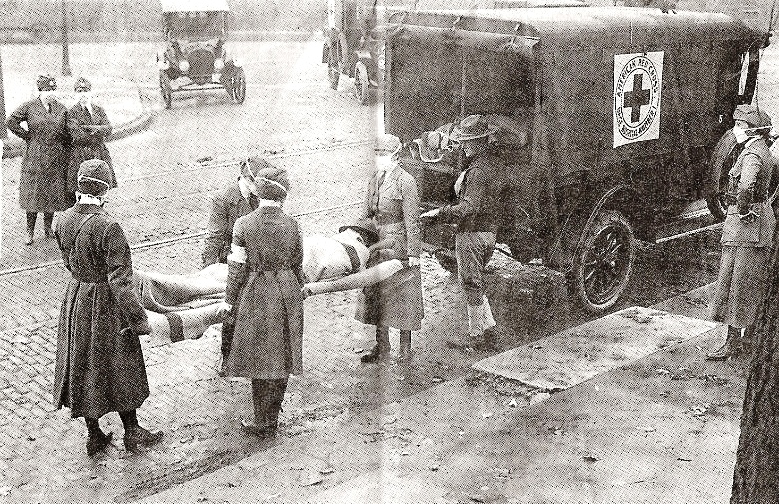Bill Gates: you need to prepare for a pandemic before it appears

The habitual world threatens us a lot. This is the possibility of the asteroid falling to Earth, and the actions of terrorists, nuclear weapons, diseases. Yes, a lot of things. Scientists are trying to develop various tools to combat these threats, albeit with varying success.
Bill Gates believes that "it is difficult to learn - it is easy in battle," and calls on everyone to prepare for a new pandemic. No one knows what the pandemic will be, how it will spread or who will be affected by it. But it becomes clear that the world is not ready for this event. Proof can be the same outbreak of human infection with the Ebola virus in Africa, and then in other countries.
Doctors were not prepared for the fact that a lot of people get sick, Ebola was defeated with great difficulty. It may well be that the next time the problem will be much more serious and it will not be so easy to cope with it. Such a threat was voiced at the World Economic Forum in Davos.
')
Representatives of many countries agreed with this view, deciding to begin funding CEPI (Coalition for Epidemic Preparedness Innovations) - a coalition that is committed to fighting epidemics. The project involved, except for other countries, Norway, India, Japan and Germany. Funds in the fight against future epidemics and pandemics are also invested by the Wellcome Trust plus the Bill and Melinda Gates Foundation.
The main focus of CEPI is the creation of vaccines that can be an effective tool in the fight against yet unknown pathogens that will threaten humans in the future. Now vaccines help fight a number of dangerous diseases that were previously considered fatal. Actually, without a vaccine, they are deadly now, so that everything that separates us from a large number of the most serious diseases is exactly the vaccine.
CEPI will work together with governments of different countries (as mentioned above), businessmen, pharmaceutical companies and vaccine manufacturers, non-profit organizations, institutes and universities. All this is done for the sake of one goal - the advance development of means and methods to counter pandemics.

Traditional vaccine development methods are too slow and inefficient. They lead to the fact that reliable means of combating dangerous infectious and viral diseases if they appear, then too late in the case of a sudden attack of pathogenic microorganisms. Rapidly spreading epidemics do not give time to sway, you need to work very quickly. Now the average time to develop a vaccine is over 10 years.
What can the lack of a reliable means of dealing with the disease is well known to everyone. Suffice it to recall the spread of the "Spanish flu" - the most dangerous strain of the virus that hit the inhabitants of many regions of our planet at the beginning of the 20th century. Then this virus caused the death of millions of people. The Spanish flu or “ Spanish flu ” was most likely the most massive flu pandemic in the entire history of mankind in absolute terms, both in terms of the number of people infected and those who died. In 1918-1919 (18 months), about 550 million people, or 29.5% of the world's population, were infected with Spaniard around the world. Approximately 50-100 million people, or 2.7-5.3% of the world's population, died, which makes it possible to consider this epidemic to be one of the largest disasters in the history of mankind. Now the man managed to frighten the Ebola virus and Zika virus, which he still manages to cope with.
In many ways, the successful fight against these viruses is due to the way they spread. One virus spreads with body fluids (that is, the patient’s direct contact with a healthy person is necessary, as in most cases infection occurs). The other one is carried by a certain type of mosquito, that is, by insects that can be controlled, and quite effectively. But if any of these viruses spread through the air, then people would have much worse. And there is simply no guarantee that this will not happen in the near future. For residents of densely populated regions, such a virus will be particularly dangerous.
And not only because the disease can be fatal. But also because a person would not have had time to develop a vaccine against such a disease, as mentioned above. Bill Gates hopes that CEPI will do its job . Initially, the organization will receive an amount of $ 460 million for work. The task is to use the most modern methods of vaccine development created by scientists, commercial private and non-profit government organizations. The work of CEPI will consist of two main areas. The first is the development of effective methods for creating vaccines that could be applied in the event of the emergence of an unknown pathogen. And second, the creation of vaccines against pathogenic microorganisms that are known to be what they are. An example is the same Ebola virus.

Work on the elimination of the consequences of the Spaniard
According to the authors of the project, genetics, which is now developing very actively, can help in the implementation of the plan. With the help of genetic engineering, you can change the cells of the human body so that we ourselves develop the necessary antibodies to combat the deadly diseases. That is, we are talking about the so-called “genetic vaccine”, which operates in a slightly different way than standard vaccines, which use weakened or dead microorganisms.
New methods of creating vaccines will help us to be more confident in our future - this time. And two - they will contribute to the effective struggle of man with modern dangerous diseases such as malaria, HIV and others.
The project participants will try to do everything so that the development of new vaccines takes less time, and state regulators from different countries quickly decide on the possibility of using one or another new tool after its successful tests. Only in this case, the fight against pathogens can be as effective as possible.
According to Gates, it is imperative to create a global system of notification of emerging threats and the associated rapid response system. And only CEPI will not be able to give a person everything that is necessary to combat pandemics. In addition, additional work is needed. The rapid response network will include thousands of hospitals from around the world, who will be the first to be able to detect the presence of a new dangerous pathogen and immediately trigger an alarm. For this, we also need specially trained specialists, whose task will be to develop methods of dealing with this threat and direct struggle.
The patient monitoring system should also change and become more efficient. This requires the training of another class of specialists who will be able to monitor both patients and be directly involved in the prompt elimination of the consequences of a pandemic or epidemic.
Pathogens - poorly, antibiotic resistant bacteria - even worse
“I would like to hope that in the next ten years we will not face any kind of epidemic, like the epidemic of Spanish flu. It seems to me that we will have significantly better and more reliable tools, we will be able to react more effectively, but now we are vulnerable if an infection spreads as fast as the flu, ”Gates said.
According to him, fear also needs to increase the resistance of microorganisms to antibiotics. Now this contributes to the improper and excessively active use of these drugs in the world. Errors in the treatment of relatively simple diseases with the help of antibiotics lead to the fact that the causative agents of tuberculosis, malaria and other harmful microorganisms acquire resistance to drugs.
Bill Gates is not the only person who fears antibiotic-resistant bacteria. Doctors predict that by 2050, such actors will kill as many as 10 million people a year worldwide. Probably, in the coming decades, such superbacteria could become one of the main causes of mortality on Earth, overtaking even such “traditional” causes as cancer diseases, car accidents and wars.
At the moment, the number of deaths caused by antibiotic-resistant microbes is not so high: about 700 thousand people a year. However, this figure continues to increase.
Not so long ago, scientists were able to get another proof that a person died due to the negative impact on his body of a resistant microbe. As it turned out, the cause of death is the bacterium Klebsiella pneumoniae. A woman who traveled around India returned home, after which she was placed in quarantine. A little later, doctors discovered a bacterium in the patient's body that is resistant to almost all known antibiotics. This bacterium was adapted to 26 antibiotics, including aminoglycosides and polymyxins. It is also partially resistant to tigtsilin - an antibiotic that was specifically designed to combat resistant microbes.
Worst of all, new antibiotics are extremely rare. The reason is almost the same as with vaccines - the need for time-consuming testing procedures for new drugs. Plus, regulators take a lot of time approving new drugs. On average, it takes about 12 years to create a new drug with its launch on the US market. There are more complex cases. For example, Paratek Pharmaceuticals, a pharmaceutical company, has been waiting for approval of its antibiotic for more than 20 years.
What to do?
In principle, the plan proposed by Gates is quite realistic and, most importantly, it can be implemented in a relatively short time. And since all this is also well funded, it must be assumed that the project will develop at a rapid pace.
After all, the danger is really real. Experts remind that we will never know exactly where the "shoot" the next time. This again may be the African hinterland, but the center of the metropolis may also become the epicenter. And for all such cases, a person must be ready and be fully armed.
Source: https://habr.com/ru/post/400765/
All Articles